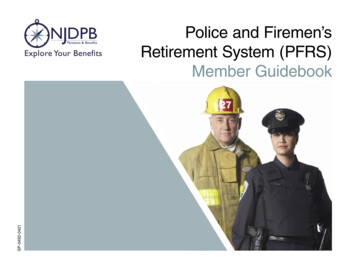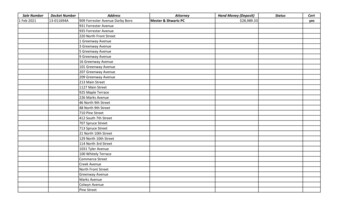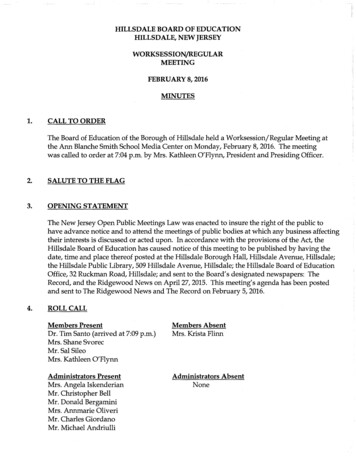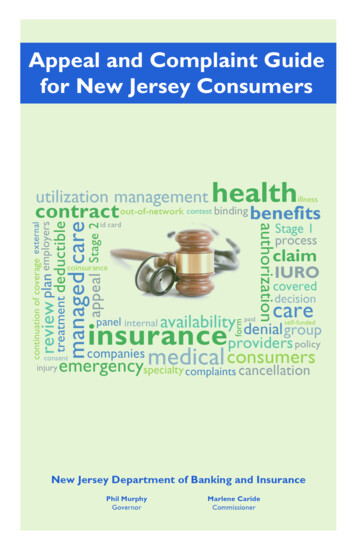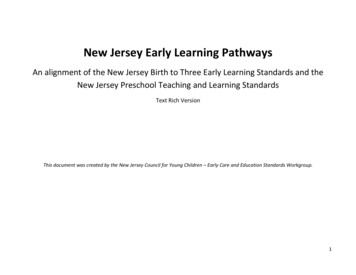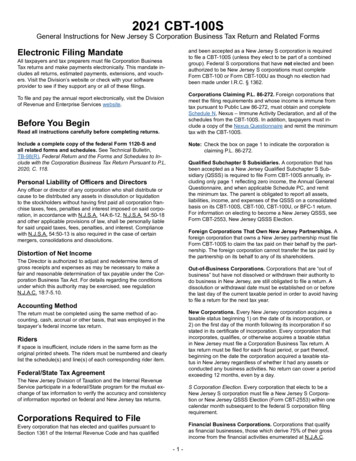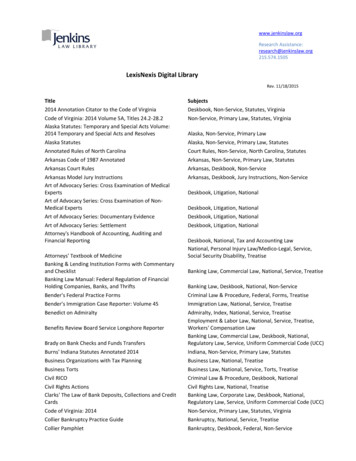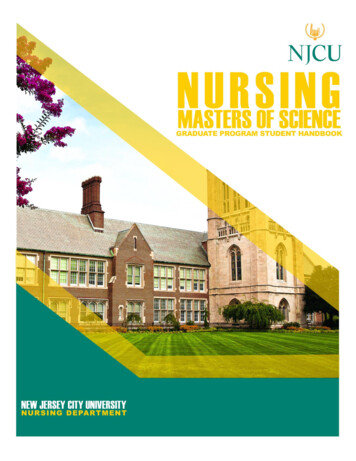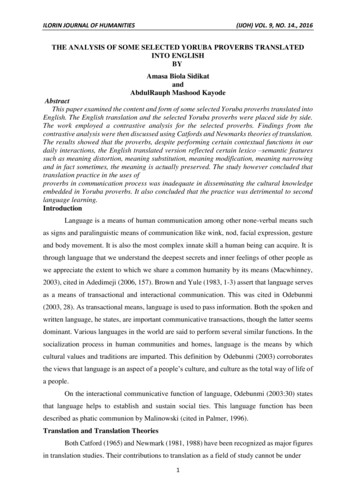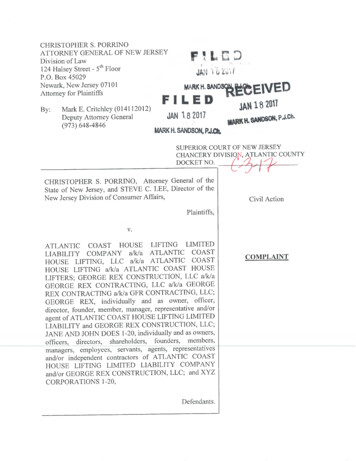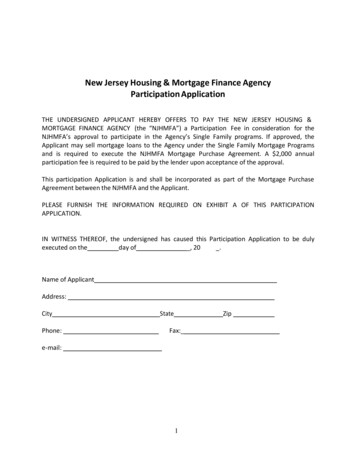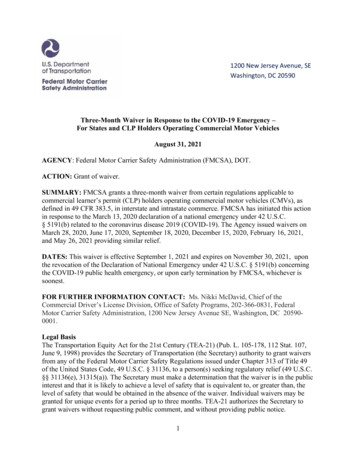
Transcription
1200 New Jersey Avenue, SEWashington, DC 20590Three-Month Waiver in Response to the COVID-19 Emergency –For States and CLP Holders Operating Commercial Motor VehiclesAugust 31, 2021AGENCY: Federal Motor Carrier Safety Administration (FMCSA), DOT.ACTION: Grant of waiver.SUMMARY: FMCSA grants a three-month waiver from certain regulations applicable tocommercial learner’s permit (CLP) holders operating commercial motor vehicles (CMVs), asdefined in 49 CFR 383.5, in interstate and intrastate commerce. FMCSA has initiated this actionin response to the March 13, 2020 declaration of a national emergency under 42 U.S.C.§ 5191(b) related to the coronavirus disease 2019 (COVID-19). The Agency issued waivers onMarch 28, 2020, June 17, 2020, September 18, 2020, December 15, 2020, February 16, 2021,and May 26, 2021 providing similar relief.DATES: This waiver is effective September 1, 2021 and expires on November 30, 2021, uponthe revocation of the Declaration of National Emergency under 42 U.S.C. § 5191(b) concerningthe COVID-19 public health emergency, or upon early termination by FMCSA, whichever issoonest.FOR FURTHER INFORMATION CONTACT: Ms. Nikki McDavid, Chief of theCommercial Driver’s License Division, Office of Safety Programs, 202-366-0831, FederalMotor Carrier Safety Administration, 1200 New Jersey Avenue SE, Washington, DC 205900001.Legal BasisThe Transportation Equity Act for the 21st Century (TEA-21) (Pub. L. 105-178, 112 Stat. 107,June 9, 1998) provides the Secretary of Transportation (the Secretary) authority to grant waiversfrom any of the Federal Motor Carrier Safety Regulations issued under Chapter 313 of Title 49of the United States Code, 49 U.S.C. § 31136, to a person(s) seeking regulatory relief (49 U.S.C.§§ 31136(e), 31315(a)). The Secretary must make a determination that the waiver is in the publicinterest and that it is likely to achieve a level of safety that is equivalent to, or greater than, thelevel of safety that would be obtained in the absence of the waiver. Individual waivers may begranted for unique events for a period up to three months. TEA-21 authorizes the Secretary togrant waivers without requesting public comment, and without providing public notice.1
The Administrator of FMCSA has been delegated authority under 49 CFR 1.87(e) and (f) tocarry out the functions vested in the Secretary by 49 U.S.C. chapter 313, relating to commercialmotor vehicle operators, and 49 U.S.C. chapter 311, subchapter I and III, relating to commercialmotor vehicle programs and safety regulations.BackgroundOn March 13, 2020, a national emergency was declared under 42 U.S.C. § 5191(b) related toCOVID-19. This waiver responds to the unique circumstances resulting from the COVID-19public health emergency and the effects on people. On March 28, 2020, June 17, 2020,September 18, 2020, December 15, 2020, February 16, 2021, and May 26, 2021, FMCSAgranted a waiver from the requirement under 49 CFR 383.25(a)(1) that a CLP holder beaccompanied by a CDL holder and from the restriction in 49 CFR 383.79(a) that limits a State toadministering a CDL skills test only to an out of state CDL applicant who has taken drivertraining in that State. The May 26 waiver will expire on August 31, 2021. FMCSA issues a newwaiver from those provisions.Though the number of COVID-19 cases began to decline in the U.S. following widespreadintroduction of vaccinations, the delta variant and lagging vaccination rates reversed thatdownward trajectory and have resulted in a rapid rise in infections and hospitalizations aroundthe country. During the COVID-19 public health emergency, many States closed or reducedhours of operation in their State Driver Licensing Agencies (SDLA) in response to the guidancefrom the U.S. Centers for Disease Control and Prevention (CDC), and if applicable, State andlocal guidance, to use social distancing to reduce the spread of COVID-19. While States havenow reopened their SDLAs, the delta variant has impacted the pace of return to normal customerservice levels in some States. As a result, some SDLAs may be unable to timely process andissue a commercial driver’s license (CDL) credential to eligible CLP holders who have passedthe driving skills test. There is a continued public need for immediate transportation of essentialsupplies, equipment, and persons, which requires an adequate and sustained supply of driverseligible to operate a CMV. FMCSA intends to review the status of this waiver as of October 1,2021 and may take action to terminate the waiver sooner if conditions warrant.FMCSA’s Determination and Regulatory Provisions WaivedConsistent with the statutory requirements for waivers, FMCSA has determined that it is in thepublic interest to issue a waiver, until November 30, 2021, limited in scope and circumstances,that is likely to achieve a level of safety that is equivalent to, or greater than, the level of safetythat would be obtained in the absence of the waiver.To respond to this unique event, and to continue the ability of intrastate and interstate CDL andCLP holders to transport goods and people, this waiver: Waives the requirement under 49 CFR 383.25(a)(1) that a CLP holder be accompaniedby a CDL holder, with the proper CDL class and endorsements, seated in the front seat ofthe vehicle while the CLP holder operates a CMV on public roads or highways. Underthe terms, conditions, and restrictions of this waiver, a CLP holder may operate a CMVon public roads or highways without an accompanying CDL holder present in the front2
seat of the vehicle, provided that the CDL holder is elsewhere in the cab. In addition, theCLP holder must be in possession of evidence from the testing jurisdiction, including anauthorized third-party tester, that the CLP holder has passed the CDL driving skills test,and, the CLP holder has a valid non-CDL driver’s license, CLP, and medical certificate,unless FMCSA’s waiver regarding expiring CDLs, CLPs and medical examiners’certificates, effective on September 1, 2021, applies. Waives the restriction under 49 CFR 383.79(a) that limits a State to administering adriving skills test, in accordance with subparts F, G, and H of 49 CFR part 383, to an outof state CDL applicant who has taken driver training in that State. Under the terms,conditions, and restrictions of this waiver, a State may elect to administer a driving skillstest to any out of state CDL applicant, regardless of where the applicant received drivertraining.States, SDLAs, and CLP holders are covered under this waiver without further action.FMCSA will not issue a finding or a determination of substantial noncompliance under 49 CFRpart 384 against States for action or inaction consistent with this waiver.FMCSA will not take an enforcement action against CLP holders for operation, or against motorcarriers for allowing the operation, of a CMV without a CDL holder present in the front seat ofthe vehicle if the CLP driver is in possession of evidence from the testing jurisdiction, includingan authorized third-party tester, that the CLP holder has passed the CDL driving skills test, and,has a valid non-CDL driver’s license, CLP, and medical certificate, unless the FMCSA waiveron expiring CDLs and medical certificates applies.Public InterestFMCSA finds that the granting of this waiver is in the public interest, given CDL and CLPholders’ critical role in delivering necessary property and passengers, including, but not limitedto, shipments of essential supplies to respond to the COVID-19 public health emergency. Inaddition, granting this waiver is in the public interest because ensuring the availability of eligibledrivers will aid in the Nation’s overall economic recovery by enabling employers’ efficientresumption of the transportation of people and cargo throughout the United States. This waiverwill also reduce the administrative burden on CLP holders during this national emergency.Safety EquivalencyDue to the limited scope of this waiver and the ample precautions that remain in place, FMCSAhas determined that the waiver is likely to achieve a level of safety that is equivalent to the levelof safety that would be obtained absent the waiver. The waiver of a particular regulation shouldnot be looked at in isolation but rather as part of the whole of all regulations governing the safetyof drivers. Waiver determinations are made holistically, taking all relevant factors into account.See International Bhd. of Teamsters v. DOT, 724 F.3d 206 (D.C. Cir. 2013). It is important tonote that this waiver does not alter any of the knowledge and skills testing requirements for aCDL, a CLP, or a necessary endorsement.3
FMCSA has determined that waiving the requirements under 49 CFR 383.25(a) will not impactsafety negatively, in light of the terms, conditions, and restrictions below. Section 383.25(a) setsforth the conditions a CLP holder must meet to operate a CMV for the purpose of behind-thewheel training on public roads or highways prior to taking the skills test, including therequirement that the driver be accompanied by a CDL holder seated in the front passenger seat.Under this waiver, a CLP holder who has passed the driving skills test may operate a CMV onpublic roads or highways without a CDL holder present in the front passenger seat. CLP holderswho have passed the driving skills test are qualified and eligible to obtain a CDL, and the onlything necessary to obtain the CDL credential is to apply at the SDLA in their State of domicile.Absent the SDLA closures and related processing delays resulting from the COVID-19 nationalemergency, these CLP holders would be able to obtain their CDL credential from the SDLAmore quickly and begin driving a CMV on public roads and highways without any on-boardsupervision. While the waiver permits the CLP holder to operate a CMV without a CDL holderin the front passenger seat, under the terms, conditions, and restrictions below, a CDL holder isrequired to be present elsewhere in the vehicle.FMCSA’s waiver is consistent with the Agency’s 2015 decision granting CR England anexemption from 49 CFR 383.25(a)(1) and FMCSA’s 2017 decision renewing the exemption (80FR 33329 (Jun. 11, 2015), 82 FR 48889 (Oct. 20, 2017)). In this regard, FMCSA granted anapplication filed by CR England, under 49 U.S.C. § 31315, seeking an exemption from49 CFR 383.25(a)(1) to allow CLP holders who have successfully passed a CDL skills test todrive a truck without a CDL holder being present in the front seat. FMCSA explained that thereis no evidence that having a CDL holder present in the front seat to accompany a CLP holderwho has passed the skills test improves safety, and found that the exemption would likelyachieve a level of safety equivalent to complying with the regulation. Moreover, neitherFMCSA’s March 28, June 17, September 18, December 15, 2020, February 6, 2021, or May 26,2021 waivers, nor the CR England exemption, which expires in 2022, have adversely affectedsafety.FMCSA has also determined that waiving the requirement under 49 CFR 383.79(a) will notnegatively impact safety. Section 383.79(a) permits, but does not require, an SDLA to allow anout of state CDL applicant to take the CDL driving skills (i.e., on-the-road) test if the applicantalso received training in that State. Under this waiver, SDLAs would be permitted to allow anout of state CDL applicant to take the CDL driving skills test regardless of where the applicantreceived training. The Federal regulations in 49 CFR part 383, subparts F, G, H, and J, set forthuniform national knowledge and skills testing procedures and antifraud measures for the States.FMCSA’s regulatory framework provides for uniform national testing standards irrespective ofwhere a CDL applicant receives training. See 49 CFR 383.131, 383.133. The waiver requires theSDLA to transmit the test results electronically directly from the testing State to the licensingState in an efficient and secure manner in accordance with 49 CFR 383.79(a)(1). FMCSA notesthat the requirement in 49 CFR 383.79(a)(2) that the State of domicile must accept the results ofa driving skills test administered to the applicant by any other State, in accordance with subpartsF, G, and H of this part, in fulfillment of the CDL applicant's testing requirements under part 383would continue to apply.4
FMCSA believes that the measures listed below under Terms, Conditions, and Restrictions of theWaiver, taken collectively, provide the assurance needed to meet the legal standard that grantingthe waiver is likely to achieve an “equivalent level of safety.” Therefore, FMCSA hasdetermined that a waiver from the regulations noted above during the period of the waiver islikely to achieve a level of safety that is equivalent to, or greater than, the level of safety thatwould be obtained in the absence of the waiver.Unique CircumstancesThe COVID-19 public health emergency led to widespread closures of State and Federalgovernment offices, reduction of government services, and disruption of transportation systems,including possible driver shortages and related interruption of supply chains, which are heavilydependent on continued CMV operations. While States have reopened their SDLAs, most haveonly resumed limited operations and the pace of return to normal operations has varied across thecountry. Consequently, there may be continued widespread delays in processing and issuingCDL credentials and other services. FMCSA finds that the circumstances surrounding thiswaiver are unique because such government operations are not providing their usual level ofservice.For the reasons above, FMCSA grants a three-month waiver as provided above, subject to theterms, conditions, and restrictions below.Terms, Conditions, and Restrictions of the WaiverThis waiver covers States and CLP holders for the period beginning at 12:00 a.m. onSeptember 1, 2021, and expires at 11:59 p.m. on November 30, 2021, upon the revocation of theDeclaration of National Emergency under 42 U.S.C. § 5191(b) concerning the COVID-19 publichealth emergency, or upon early termination by FMCSA, whichever is soonest.(1) A CLP holder operating a CMV in accordance with this waiver must maintain in the vehicledocumentary evidence from an SDLA or an authorized third-party tester showing that thedriver passed the CDL driving skills test and must carry his/her non-CDL driver’s license andCLP while operating the CMV.(2) A CLP holder operating a CMV in accordance with this waiver must be accompanied by aCDL holder, with the proper CDL class and endorsements, present in the vehicle, althoughnot necessarily seated in the front passenger seat.(3) This waiver does not apply to a CLP holder if the driver’s privileges have been suspended orwithdrawn for offenses requiring disqualification under 49 CFR 383.51.(4) This waiver does not apply to a CLP holder subject to a driver imminent hazard order under49 CFR 383.52 or disqualified under 49 CFR 391.11.(5) This waiver does not apply to a CLP holder who does not have a valid medical examiner’scertificate, unless FMCSA’s waiver regarding expiring CDLs, CLPs and medical examiners’certificates, effective on September 1, 2021, applies and the driver is in compliance with theterms, conditions, and restrictions of that waiver.5
(6) This waiver does not apply to a CLP holder who is prohibited from performing safetysensitive functions under 49 CFR 382.501.(7) This waiver does not apply to CMV operations requiring the following endorsements: T(double/triple trailers); P (passenger), N (tank vehicle), H (hazardous materials), X(combination of tank vehicle and hazardous materials), and S (school bus).(8) An SDLA that elects to administer a CDL driving skills test to an out of state applicant underthis waiver must transmit the test results electronically directly from the testing State to thelicensing State in an efficient and secure manner in accordance with 49 CFR 383.79(a)(1).(9) Accident Notification. Each motor carrier must notify FMCSA within 5 business days of anaccident (as defined in 49 CFR 390.5), involving any CLP holder operating under the termsof this waiver. See 49 CFR 390.15(b) (requiring maintenance of accident registry.)Notification shall be by email to MCPSD@DOT.GOV. The notification must include thefollowing information:i.ii.iii.iv.v.vi.vii.viii.Date of the accident;City or town, and State in which the accident occurred, or closest to the accident scene;Driver’s name and license number;Vehicle number and State license number;Number of individuals suffering physical injury;Number of fatalities;The police-reported cause of the accident (if available at time of the report); andWhether the driver was cited for violation of any traffic laws, or motor carrier safetyregulations.(10) FMCSA reserves the right to revoke this waiver for drivers’ involvement in accidents, motorcarriers’ failure to report accidents, and drivers’ failure to comply with the restrictions ofthis waiver.Issued: August 31, 2021Meera JoshiDeputy Administrator6
Though the number of COVID-19 cases began to decline in the U.S. following widespread . DOT, 724 F.3d 206 (D.C. Cir. 2013). It is important to . FMCSA's waiver is consistent with the Agency's 2015 decision granting CR England an exemption from 49 CFR 383.25(a)(1) and FMCSA's 2017 decision renewing the exemption (80 .
